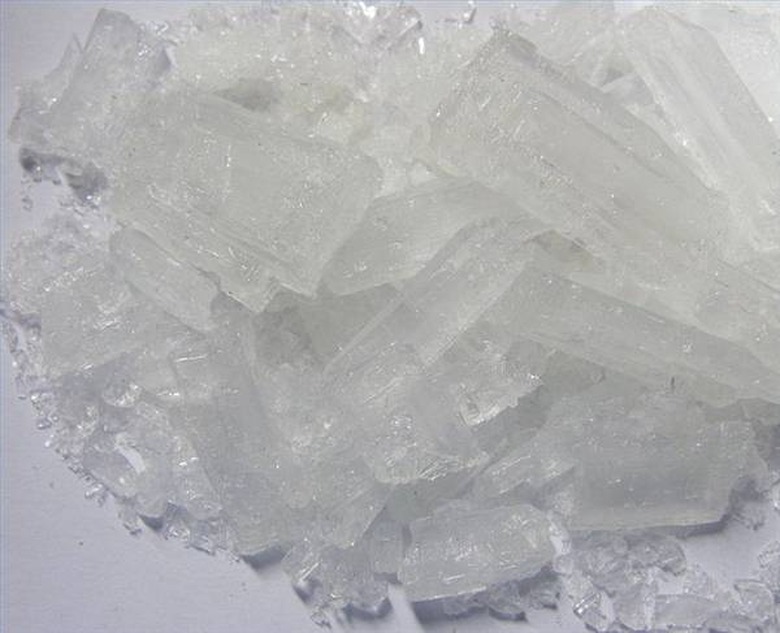How To Make A Supersaturated Solution
Pour sugar crystals into water and stir, and the sugar will dissolve. Keep pouring and stirring, and at a certain point, no more will dissolve, and the crystals will fall to the bottom of the glass. At this point, the solution is said to be saturated. But hold on – you can get more sugar crystals to dissolve by heating the water. When you've reached the saturation point, and more sugar dissolves, you get a supersaturated solution. You can do this with salt, sugar, sodium acetate crystals and anything else that will dissolve in water. In fact, you don't even need water to create a supersaturated solution. You can do it with alcohol, paint thinner or any other solvent. It's easiest to do it with water, though, because water is the best solvent in the world.
What Is a Saturated Solution?
What Is a Saturated Solution?
Water is one of the most interesting and important chemical compounds there is. Each water molecule is composed of two positively charged hydrogen atoms and a negatively charged oxygen atom. The hydrogen atoms arrange themselves on the much bigger oxygen atom to create a net polarity from one side of the molecule to the other. Because of this, water molecules form bonds with each other in a process called hydrogen bonding.
When you introduce a solute, such as sugar or salt, the water molecules are attracted to the solute atoms and molecules more strongly than they are attracted to each other. They surround the solute molecules, and as they do, the solute gradually disintegrates. Its component atoms and molecules drift away, each one surrounded by water molecules, and the solute dissolves. If you keep stirring in more solute, though, you eventually run out of water molecules to do this work, and at this point, the solution is saturated.
How to Make a Supersaturated Solution
How to Make a Supersaturated Solution
The way to make a supersaturated solution is to add heat, but just a little heat won't do the job. You have to heat the water close to the boiling point. When the water gets this hot, the water molecules have more freedom to move around, and there is more space for solute molecules between them. You can keep stirring in salt, sugar or any other solute, and it will continue to dissolve, even though the saturation point has been reached. Take away the heat and let the solution gradually cool, and the solute will remain dissolved, at least for a time. This is, in essence, the supersaturated definition. A supersaturated solution is highly unstable, and strange things can happen.
Hot Ice, Rock Candy and Crystal Formation
Hot Ice, Rock Candy and Crystal Formation
Have you ever heard of hot ice? It's produced from a supersaturated solution of water and sodium acetate crystals. When you introduce a single sodium acetate crystal into such a solution, it's like a trigger that initiates a sudden reaction whereby all the excess sodium acetate in solution quickly crystallizes. This is an exothermic process that gives off heat, so while the reaction produces ice-like crystals, it also produces heat, hence the name hot ice. To see a dramatic demonstration of crystal formation, pour the supersaturated solution slowly onto a few undissolved crystals. The crystallization happens so quickly that a crystal tower will form as you pour.
A similar process occurs when you heat water to the boiling point, stir in sugar, let the solution cool and suspend a string in the solution. The sugar gradually coalesces on the string and forms a large crystal that you can enjoy as candy. A word to the wise: Enjoy rock candy in moderation, and be sure to brush your teeth. Sugar contributes to the formation of cavities.
Cite This Article
MLA
Deziel, Chris. "How To Make A Supersaturated Solution" sciencing.com, https://www.sciencing.com/make-supersaturated-solution-4885939/. 12 October 2018.
APA
Deziel, Chris. (2018, October 12). How To Make A Supersaturated Solution. sciencing.com. Retrieved from https://www.sciencing.com/make-supersaturated-solution-4885939/
Chicago
Deziel, Chris. How To Make A Supersaturated Solution last modified March 24, 2022. https://www.sciencing.com/make-supersaturated-solution-4885939/
